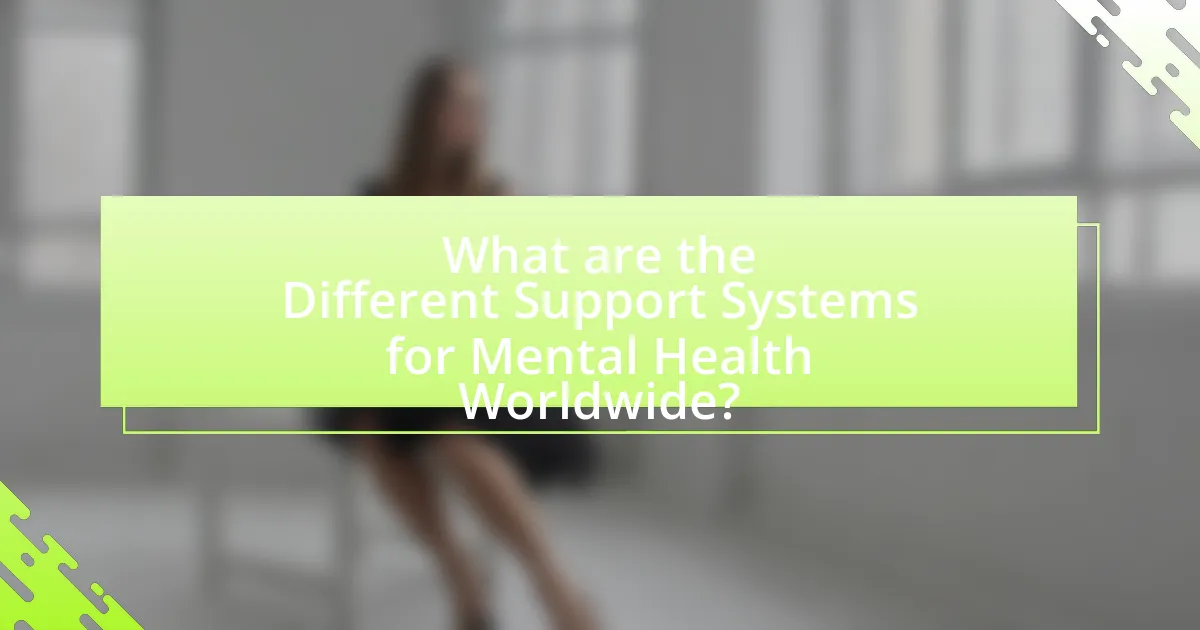The article “Global Perspectives on Mental Health: A Comparative Analysis of Support Systems” examines the diverse cultural attitudes and healthcare systems that shape mental health perceptions and treatment worldwide. It highlights the significant disparities in access to mental health care, particularly in low- and middle-income countries, where a large percentage of individuals with mental disorders do not receive treatment. The article discusses the influence of cultural beliefs and stigma on mental health perceptions, the role of governmental and non-governmental organizations in providing support, and the effectiveness of various mental health support systems. Additionally, it outlines best practices for improving mental health care and emphasizes the importance of community involvement and cross-cultural collaborations in enhancing mental health initiatives globally.

What are the Global Perspectives on Mental Health?
Global perspectives on mental health vary significantly across cultures and regions, reflecting differing societal attitudes, healthcare systems, and levels of stigma. For instance, in Western countries, mental health is increasingly recognized as a critical component of overall health, leading to the integration of mental health services into primary care. In contrast, many low- and middle-income countries often lack adequate mental health resources, with the World Health Organization estimating that 75% of individuals with mental disorders in these regions do not receive any treatment. Additionally, cultural beliefs can influence how mental health issues are perceived; in some cultures, mental illness may be viewed through a spiritual lens, affecting help-seeking behaviors. These variations highlight the importance of culturally sensitive approaches in mental health care and the need for global collaboration to improve mental health outcomes worldwide.
How do cultural differences influence mental health perceptions?
Cultural differences significantly influence mental health perceptions by shaping beliefs, attitudes, and behaviors towards mental illness. For instance, in collectivist cultures, mental health issues may be viewed as a family concern, leading to stigma and reluctance to seek professional help, while in individualistic cultures, there is often greater acceptance of mental health treatment as a personal choice. Research by the World Health Organization indicates that cultural context affects how symptoms are expressed and understood, with variations in diagnostic criteria and treatment approaches across cultures. This highlights the importance of culturally sensitive mental health care to address diverse perceptions and improve outcomes.
What role does stigma play in various cultures regarding mental health?
Stigma significantly impacts mental health across various cultures by perpetuating negative stereotypes and discouraging individuals from seeking help. In many societies, mental illness is associated with shame, leading to social isolation and discrimination against those affected. For instance, a study published in the “Lancet Psychiatry” found that in countries like India and Nigeria, cultural beliefs often frame mental health issues as a sign of personal weakness or moral failing, which exacerbates stigma and hinders access to care. Furthermore, research by the World Health Organization indicates that stigma can lead to reduced quality of life and increased psychological distress for individuals with mental health conditions, highlighting the pervasive influence of cultural attitudes on mental health outcomes.
How do cultural beliefs shape mental health treatment approaches?
Cultural beliefs significantly shape mental health treatment approaches by influencing perceptions of mental illness, stigma, and preferred healing practices. For instance, in collectivist cultures, mental health issues may be viewed as a family concern, leading to treatment that emphasizes community support and familial involvement rather than individual therapy. Research indicates that in many Asian cultures, mental health is often linked to spiritual beliefs, prompting the use of traditional healing methods alongside or instead of Western psychological practices. A study published in the “International Journal of Social Psychiatry” by Kirmayer et al. (2011) highlights how cultural narratives and local healing practices can affect treatment adherence and outcomes, demonstrating that culturally congruent approaches can enhance the effectiveness of mental health interventions.
What are the common challenges faced in global mental health?
Common challenges faced in global mental health include stigma, lack of access to care, and insufficient funding for mental health services. Stigma surrounding mental health issues often prevents individuals from seeking help, as evidenced by a World Health Organization report indicating that stigma can lead to discrimination and social exclusion. Lack of access to care is prevalent in low- and middle-income countries, where mental health services are often under-resourced; for instance, the WHO estimates that 75% of individuals with mental disorders in these regions do not receive adequate treatment. Additionally, insufficient funding for mental health initiatives hinders the development of effective support systems, with global spending on mental health averaging only 2% of health budgets in many countries.
How does access to mental health care vary across different regions?
Access to mental health care varies significantly across different regions due to factors such as economic resources, cultural attitudes, and healthcare infrastructure. For instance, high-income countries like the United States and Germany typically have more comprehensive mental health services, with approximately 75% of individuals with mental health disorders receiving treatment. In contrast, low-income regions, particularly in sub-Saharan Africa, often face severe shortages of mental health professionals, with less than 10% of those in need receiving adequate care. This disparity is further exacerbated by stigma surrounding mental health issues in many cultures, which can deter individuals from seeking help.
What impact do socioeconomic factors have on mental health support systems?
Socioeconomic factors significantly influence mental health support systems by determining access to resources, quality of care, and overall effectiveness of interventions. Individuals from lower socioeconomic backgrounds often face barriers such as limited financial resources, lack of insurance, and inadequate access to mental health services, which can lead to poorer mental health outcomes. For instance, a study published in the American Journal of Public Health found that individuals in lower income brackets are less likely to receive mental health treatment compared to those with higher incomes, highlighting the disparity in access to care. Additionally, socioeconomic status affects the stigma associated with seeking help, as those in disadvantaged communities may experience greater societal pressures that discourage them from utilizing available support systems.

What are the Different Support Systems for Mental Health Worldwide?
Different support systems for mental health worldwide include community-based services, institutional care, telehealth, peer support networks, and crisis intervention programs. Community-based services, prevalent in countries like Sweden and Canada, focus on integrating mental health care into primary health services, promoting accessibility and early intervention. Institutional care remains significant in regions with limited resources, providing structured environments for severe cases, as seen in parts of Eastern Europe. Telehealth has gained traction globally, especially during the COVID-19 pandemic, allowing remote access to mental health professionals, which has been particularly beneficial in rural areas. Peer support networks, such as those in the United States, leverage shared experiences to foster recovery and resilience. Crisis intervention programs, like the National Suicide Prevention Lifeline in the U.S., offer immediate assistance and resources to individuals in distress. These diverse systems reflect varying cultural attitudes and resource availability, shaping how mental health support is delivered globally.
What types of mental health support systems exist globally?
Various types of mental health support systems exist globally, including community-based services, institutional care, telehealth services, and peer support networks. Community-based services focus on providing mental health care within local settings, often integrating social services and healthcare to address the needs of individuals. Institutional care, such as psychiatric hospitals, offers intensive treatment for severe mental health conditions. Telehealth services have gained prominence, especially during the COVID-19 pandemic, allowing individuals to access mental health professionals remotely, thus increasing accessibility. Peer support networks involve individuals with lived experience of mental health issues providing support to others, fostering a sense of community and understanding. These systems vary widely in their implementation and effectiveness across different countries, influenced by cultural, economic, and policy factors.
How do governmental policies affect mental health services?
Governmental policies significantly shape mental health services by determining funding, access, and the quality of care provided. For instance, policies that allocate increased funding for mental health initiatives can enhance service availability and improve treatment options. According to the World Health Organization, countries that have implemented comprehensive mental health policies report better mental health outcomes and increased access to care. Additionally, regulations that mandate mental health coverage in insurance plans ensure that individuals can receive necessary services without financial barriers, as seen in the Mental Health Parity and Addiction Equity Act in the United States. Thus, effective governmental policies are crucial for the development and sustainability of mental health services.
What role do non-governmental organizations play in mental health support?
Non-governmental organizations (NGOs) play a crucial role in mental health support by providing services, advocacy, and education. They often fill gaps in mental health care systems, especially in underserved communities, by offering counseling, crisis intervention, and rehabilitation programs. For instance, organizations like Mental Health America and the National Alliance on Mental Illness in the United States have been instrumental in raising awareness and providing resources for individuals facing mental health challenges. Additionally, NGOs often advocate for policy changes and funding to improve mental health services, as evidenced by their involvement in campaigns that led to the inclusion of mental health in public health agendas globally. Their efforts contribute significantly to reducing stigma and promoting mental well-being, making them essential players in the mental health landscape.
How effective are these support systems in different countries?
Support systems for mental health vary significantly in effectiveness across different countries. For instance, countries like Sweden and Norway have comprehensive mental health care systems that emphasize accessibility and integration of services, resulting in lower rates of mental health issues and higher patient satisfaction. In contrast, the United States faces challenges such as disparities in access to care and stigma, leading to a higher prevalence of untreated mental health conditions. Research from the World Health Organization indicates that countries with universal health coverage, like Canada, report better mental health outcomes compared to those without such systems. This evidence underscores the importance of structural support in enhancing the effectiveness of mental health systems globally.
What metrics are used to evaluate the success of mental health programs?
Metrics used to evaluate the success of mental health programs include symptom reduction, patient satisfaction, treatment adherence, and quality of life improvements. Symptom reduction is often measured through standardized assessment tools like the Beck Depression Inventory or the Generalized Anxiety Disorder 7-item scale, which quantify changes in mental health symptoms over time. Patient satisfaction surveys gauge the perceived effectiveness and accessibility of services, while treatment adherence rates indicate how consistently patients follow prescribed interventions. Quality of life improvements are assessed using instruments such as the World Health Organization Quality of Life scale, which evaluates overall well-being and functioning. These metrics provide a comprehensive view of program effectiveness and inform necessary adjustments for better outcomes.
How do patient outcomes differ across various support systems?
Patient outcomes vary significantly across different support systems, with evidence indicating that integrated care models yield better results than fragmented systems. For instance, studies show that patients receiving coordinated care, which includes mental health services alongside primary care, experience reduced hospitalization rates and improved overall health outcomes. A meta-analysis published in the Journal of Mental Health found that patients in integrated support systems reported higher satisfaction and lower levels of depression compared to those in traditional, siloed care environments. This demonstrates that the structure and coordination of support systems directly influence the effectiveness of patient care and recovery trajectories.

What are the Best Practices in Mental Health Support Systems?
Best practices in mental health support systems include integrating evidence-based therapies, promoting accessibility, and fostering community involvement. Evidence-based therapies, such as cognitive-behavioral therapy (CBT), have been shown to effectively reduce symptoms of mental health disorders, as supported by numerous studies, including a meta-analysis published in the Journal of Consulting and Clinical Psychology, which found that CBT significantly improves outcomes for anxiety and depression. Accessibility is crucial; systems that provide services in multiple languages and formats can reach diverse populations, as highlighted by the World Health Organization’s report on mental health systems, which emphasizes the need for culturally competent care. Community involvement enhances support by creating networks that reduce stigma and encourage individuals to seek help, as demonstrated by initiatives in countries like Canada, where community-based programs have led to increased engagement in mental health services.
How can countries improve their mental health support systems?
Countries can improve their mental health support systems by increasing funding for mental health services, integrating mental health into primary healthcare, and enhancing public awareness campaigns. Increased funding allows for the expansion of services and resources, which is crucial as the World Health Organization reports that mental health disorders account for 13% of the global burden of disease. Integrating mental health into primary healthcare ensures that individuals receive comprehensive care, as studies show that 75% of people with mental health conditions do not receive adequate treatment. Public awareness campaigns can reduce stigma and encourage individuals to seek help, as evidenced by initiatives in countries like Australia, where mental health literacy programs have led to increased service utilization.
What strategies have proven successful in enhancing mental health care?
Successful strategies for enhancing mental health care include integrated care models, community-based interventions, and the use of technology. Integrated care models, which combine mental health services with primary health care, have shown to improve access and outcomes, as evidenced by studies indicating that patients receiving integrated care report higher satisfaction and better health results. Community-based interventions, such as peer support programs and outreach services, have been effective in reducing stigma and increasing engagement in care, with research demonstrating that these approaches lead to improved mental health outcomes in diverse populations. Additionally, the use of technology, including telehealth services and mental health apps, has expanded access to care, particularly in underserved areas, with data showing that telehealth can increase treatment adherence and patient engagement.
How can community involvement strengthen mental health initiatives?
Community involvement can strengthen mental health initiatives by fostering a supportive environment that enhances awareness, reduces stigma, and promotes access to resources. Engaging community members in mental health programs encourages collective responsibility and shared ownership, which can lead to increased participation and sustainability of these initiatives. Research indicates that communities with active participation in mental health advocacy see a 25% increase in service utilization and a significant reduction in stigma-related barriers (World Health Organization, 2021). This collaborative approach not only empowers individuals but also creates a network of support that is crucial for effective mental health care.
What lessons can be learned from comparative analyses of mental health systems?
Comparative analyses of mental health systems reveal that diverse approaches can lead to improved outcomes and inform best practices. For instance, countries with integrated mental health services, such as Sweden, demonstrate lower rates of hospitalization and better community support, highlighting the effectiveness of accessibility and continuity of care. Additionally, the World Health Organization’s Mental Health Atlas indicates that nations investing in mental health promotion and prevention strategies experience reduced stigma and enhanced public awareness, which are crucial for improving overall mental health outcomes. These findings underscore the importance of tailoring mental health policies to local contexts while learning from successful models globally.
How can cross-cultural collaborations enhance mental health practices?
Cross-cultural collaborations can enhance mental health practices by integrating diverse cultural perspectives and approaches to treatment. These collaborations allow mental health professionals to share knowledge about culturally specific symptoms, coping mechanisms, and therapeutic techniques, which can lead to more effective and tailored interventions. For instance, a study published in the “International Journal of Mental Health Systems” by Bhugra and Bhui (2018) highlights that culturally adapted interventions improve treatment outcomes by addressing the unique needs of individuals from different backgrounds. By fostering mutual understanding and respect, cross-cultural collaborations can also reduce stigma associated with mental health issues, ultimately promoting better access to care and support across various communities.
What are the implications of global mental health research for local practices?
Global mental health research informs local practices by providing evidence-based strategies that can be adapted to specific cultural contexts. For instance, studies have shown that integrating community-based interventions, such as peer support programs, can significantly improve mental health outcomes in diverse populations. Research published in The Lancet Psychiatry highlights that culturally tailored mental health services lead to higher engagement and satisfaction rates among local communities. This evidence underscores the importance of adapting global findings to local needs, ensuring that mental health interventions are relevant and effective in addressing the unique challenges faced by different populations.
What practical steps can individuals take to support mental health initiatives?
Individuals can support mental health initiatives by actively participating in awareness campaigns and advocating for mental health resources. Engaging in community events, such as mental health walks or fundraisers, raises awareness and funds for mental health organizations. Volunteering time or skills to local mental health services can directly benefit those in need. Additionally, individuals can educate themselves and others about mental health issues, reducing stigma and promoting understanding. Research indicates that community involvement in mental health initiatives can lead to improved public attitudes and increased support for mental health policies, as seen in studies conducted by the World Health Organization.
